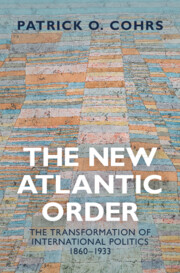Book contents
- The New Atlantic Order
- The New Atlantic Order
- Copyright page
- Dedication
- Contents
- Acknowledgements
- Abbreviations
- Maps
- Introduction
- Part I Inevitable Descent into the Abyss?
- 1 Peace Through Equilibrium
- 2 Transformation and Corrosion
- 3 The “Ascent” of an Exceptionalist World Power
- 4 Counterforces – and First Visions of a Novel Transatlantic Peace
- 5 The Unavoidable War?
- Part II The Greatest War – and No Peace without Victory
- Part III Reorientations and Incipient Learning Processes
- Part IV No Pax Atlantica
- Epilogue The Political Consequences of the Peace
- Bibliography
- Index
2 - Transformation and Corrosion
The Turn Towards Power Politics and Global Imperialist Competition in the Formative Decades of the Long Twentieth Century
from Part I - Inevitable Descent into the Abyss?
Published online by Cambridge University Press: 22 April 2022
- The New Atlantic Order
- The New Atlantic Order
- Copyright page
- Dedication
- Contents
- Acknowledgements
- Abbreviations
- Maps
- Introduction
- Part I Inevitable Descent into the Abyss?
- 1 Peace Through Equilibrium
- 2 Transformation and Corrosion
- 3 The “Ascent” of an Exceptionalist World Power
- 4 Counterforces – and First Visions of a Novel Transatlantic Peace
- 5 The Unavoidable War?
- Part II The Greatest War – and No Peace without Victory
- Part III Reorientations and Incipient Learning Processes
- Part IV No Pax Atlantica
- Epilogue The Political Consequences of the Peace
- Bibliography
- Index
Summary
Chapter 2 illuminates the transformation of the European and global international system in the first decades of the “long” 20th century (1860–1914). It analyses how the turn towards ever more uncompromising power politics, the emergence of modern states and the intensification of ever more unlimited imperialist competition between older and aspiring world powers – essentially, the European great powers, the United States and Japan – came to recast Europe and the world. It throws into relief how this competition and the rise of dominant imperialist, militarist and “civilisational Darwinist” doctrines and assumptions not only led to the creation of a new global hierarchy characterised by unprecedented inequalities between imperial world states, smaller states and those who were subjected to different forms of informal imperialist domination and formal colonisation. And it offers new perspectives on how the confluence of European balance-of-power practices and escalating global rivalries successively corroded international peace.
Keywords
- Type
- Chapter
- Information
- The New Atlantic OrderThe Transformation of International Politics, 1860–1933, pp. 64 - 89Publisher: Cambridge University PressPrint publication year: 2022

